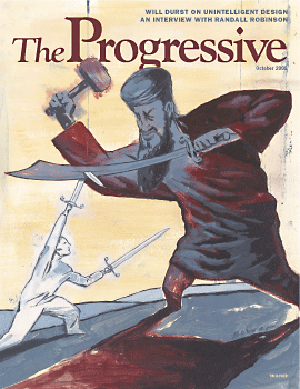I’ve just about had it. I cannot watch one more episode of the Daily Show which makes racist jokes about Arabs and Muslims. I am sick and tired of people who see themselves as part of the left writing articles that put a liberal gloss over what is, in essence, a right-wing “clash of civilizations” argument. And I am fed up with an anti-war movement in the United States that will do nothing to defend Muslims against all the attacks they have faced both domestically and internationally. So, I feel compelled to speak out against the steady rightward drift among sections of the left since 9/11 on the question of anti-Arab and anti-Muslim racism. The Danish cartoon controversy, and the anemic response by the left in this country, is only the latest example of this drift.
Unlike in Britain and elsewhere, where the anti-war movement has called demonstrations in solidarity with Muslims outraged over the cartoons, US national organizations like United for Peace and Justice have done little. This should come as no surprise given the extent to which liberals have accepted and internalized right-wing arguments like Samuel Huntington’s “clash of civilizations” thesis which sees the West as a force for enlightenment and the East as barbaric. Similarly, right-winger Niall Fergusson’s argument is that the US should take on the mantle of being a “good empire” that brings democracy and secularism to failed states, apparently just like its British predecessor. We saw these arguments being echoed on the left when
- liberals supported the Afghan war, buying into Bush’s argument that it would “liberate” Afghan women;
- sections of the left peddled a soft “White Man’s Burden” line calling for continued occupation of Iraq by the US (or the UN) on the grounds that if the US left the country it would degenerate into civil war;
- sections of the left argued that indeed the Bush administration was “bringing democracy” to the Middle East because elections were held in various countries.
 |
And yet, as bad as things were, they would only get worse. In October, 2005, The Progressive featured an article by Sasha Abramsky that cast the conflict between East and West in terms that the late Edward Said would have called orientalist. Abramsky raves that Al Qaeda, a “classically imperialist” force, must be vanquished by the West because it hates the best points of the West, in particular “the pluralism, the rationalism, individual liberty, the emancipation of women, the openness and social dynamism that represent the strongest legacy of the Enlightenment.” Never mind that the emancipation of women is far from a done deal, or that even small gains like universal suffrage had to be fought for by workers, women, and minorities, hardly the “legacy” of Enlightenment. If it weren’t appalling enough that The Progressive ran this article, to make matters worse, it did so with a cover page that featured a racist caricature of a large Muslim man (identified by his beard, turban, and menacing scimitar) pitted against a puny white figure fighting what appears to be uneven battle in the “clash of civilizations.”
Now here comes the Danish cartoon controversy, and articles by Christopher Fons and Richard Neville on the progressive website CounterPunch continue this line of argumentation. When Fons, in an article titled “Chill Out Jihadis” (8 February 2006), champions the “universal values” of suffrage and equality bequeathed by the “Western tradition” as a way to call for greater assimilation of Muslims into various European countries, he is, whether he wants to accept it or not, making a right-wing argument. Fons states:
Another way of looking at the issue is through the lens of immigration. Let’s say there is a small Scandinavian country with a functioning social democratic system and you want to do your internationalist duty and allow millions of people to come into your country from all over the world where people are fleeing economic and political despotism. If said immigrants bring with them backward ideas, like sexism, religious superstition, belief in inequality, etc. . . what will be the result for your good deed? It could transform the place into a backward place not because said immigrants are inferior human beings but because their cultural traditions have been respected. Should we thus sacrifice equality and social democracy on the alter of tolerance for oppressed groups?
We don’t have to imagine a Scandinavian country in which this debate is taking place. Denmark recently passed a series of draconian anti-immigrant laws that drastically cut social benefits for refugees, restricted asylum to immigrants even in cases where there are humanitarian grounds, and made the naturalization process a lot harder. These laws were supported by the governing liberal and conservative parties.
But I will quote the far right, the Danish People’s Party, to illustrate how Fons’ arguments are not that far from those of the right. In response to Swedish criticisms of Denmark’s anti-immigrant laws, Pia Kjaersgaard, chairperson of the DPP, stated that “[i]f the Swedes in Stockholm, Göteborg and Malmö want to create a Scandinavian Beirut with clan wars, lynchings and mass murders, then they can do so. We can close the Öresund Bridge whenever we want.” In short, while the right uses blatantly racist terms, Fons in milder language makes an argument about why this imaginary Scandinavian country might not want to “transform the place into a backward place.” Back in 2002, when these laws were passed, Jyllands Posten ran articles that condemned the anti-immigrant laws stating that they would only create a new underclass of people. Yet, a few short years later, the paper would print the racist cartoons that have inspired this controversy. The role of the left in this context is to take a principled anti-racist and pro-immigrant stance and not to provide a left cover for right-wing arguments.
Richard Neville, in an article that originally ran in the Sydney Morning Herald but was published on 9 February 2005 by CounterPunch, defends the cartoons, stating that freedom of speech can “open the eyes” of the two sides, presumably Islam and the West, that are equally “blinded by belief.” Neville wonders why the “rampaging Muslims are so angry,” especially since the “caricatures of Mohammed are mild” and “even funny.” He goes on to imply that Muslims don’t have a sense of humor. However, making fun of Islam is not the same as making fun of Christianity. The US, led by a fundamentalist Christian President, has used virulent Islamophobic language reminiscent of the crusades to justify the destruction and horror that it has wrought on the Middle East. Islam and Christianity do not occupy an equal position in a world dominated by US imperialism. Thus, the argument for “equal-opportunity” humor in an unequal world amounts to lending support to US imperialism. One can easily see writers at South Park or even The Daily Show arguing that “we make fun of everyone, and so it’s okay to make racist comments about Arabs and Muslims.” But we know that the “equal-opportunity” humor argument holds no water when you are talking about oppressed and disempowered people, who do not have equal access to the mass media. Jokes are political. The jokes of the dominant poking fun at the marginalized, unlike those of the powerless satirizing the powerful, are a way of communicating to the world, first of all to the marginalized themselves: their oppression is acceptable . . . even funny.
Perhaps the way to look at this “equal-opportunity” humor argument is to see how the Katrina crisis was discussed. When the government abandoned the victims of Katrina, who were mainly poor and black, it was not only the left liberal Daily Show but mainstream media outlets that rightly criticized the Bush administration and took the side of the victims. Thankfully, no one on the left, to the best of my recollection, made light of, or made fun of, the angry African American men and women who expressed outrage at the failures of the government. Yet, when predominantly Muslim immigrant youth in France protested in November, 2005, the same empathy was not accorded to them.
What I’m arguing is that there is no neutral point in a world characterized by racism, wars, and imperialism — you are either on the side of the oppressed or the oppressor. One may have criticisms of how sections of the oppressed have chosen to resist, but you still have to take a side. Furthermore, in a world where the media are dominated by pro-war US, UK, and Australian conglomerates that do all they can to marginalize dissenting voices, “free speech” is a liberal fantasy that masks the reality that speech is “free” only for those who are rich enough to spend liberally and freely buy the speech that serves their interests. A “free speech” defense of the racist cartoons, condemning the protests against them, is liberal cover for right-wing arguments.
Since 9/11, the assault on Muslims has escalated the world over. They have been treated with suspicion, harassed at airports, illegally detained, deported from Western nations, imprisoned for long periods without due process, and tortured in the most barbaric ways in prisons from Abu Ghraib to Guatanamo. Two predominantly Muslim nations have been invaded and occupied, with well over 100,000 killed. It is not a few cartoons that people are angry about, but the sum total of humiliation, violence, and misery that Muslims and the people of the Middle East have endured. Anyone who claims to be progressive, to be on the left, needs to take a principled stand in defense of the right of ordinary Muslims all over the world to express outrage over these cartoons.
 |
Deepa Kumar is Assistant Professor of Journalism and Media Studies at Rutgers University. She has written several scholarly articles on the media and the “war on terror” (see the journals Media, Culture and Society, Feminist Media Studies, and Communication and Critical/Cultural Studies). Her forthcoming book Outside the Box: Corporate Media, Globalization and the UPS Strike (University of Illinois Press, 2006) is about how collective struggle can impact the media and society.
